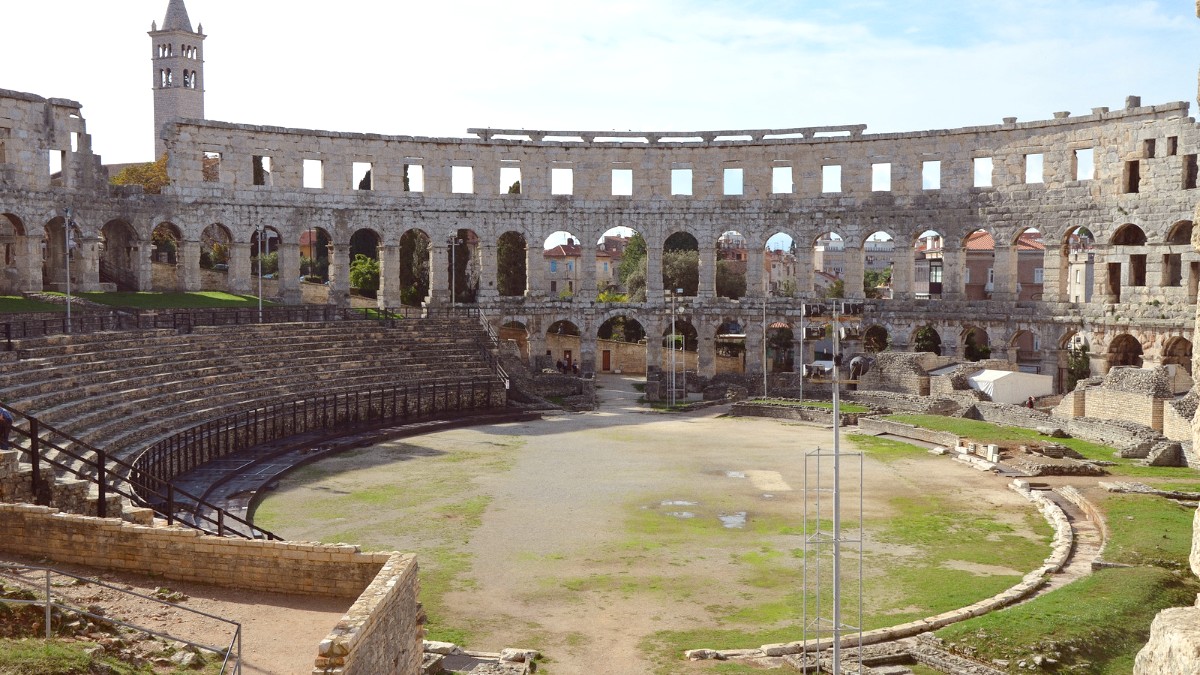
Istria, Croatia
Selecting the optimal time for your Pula visit significantly shapes your experience, influencing activities, crowd levels, and costs. Pula's Mediterranean climate offers distinct seasons, each with its own advantages and considerations.
Climate patterns throughout the year:
June to early September offers the warmest sea temperatures and most reliable beach weather. April-May and September-October maintain comfortable temperatures for active exploration without the summer heat. Autumn (September-November) is the prime season for wine tasting and truffle hunting. July and August host the majority of Pula's major cultural events, including the Pula Film Festival in the Arena.
Consider early June or mid-September for a mix of beach relaxation and sightseeing. You avoid peak crowds and heat while still finding warm sea temperatures.
Croatia's entry into the Schengen Area simplified travel, but specific visa and entry requirements for your nationality stand.
Common visa rules apply. A valid Schengen visa or visa-free agreement with Schengen Area allows entry to Croatia for short stays (up to 90 days within any 180-day period).
Visa-Free Entry: Citizens from Schengen member states, EU/EEA, US, Canada, UK, Australia, NZ, and many others.
Schengen Visa (Type C): Required for citizens not on the visa-free list. Apply at the Croatian embassy or consulate. IVisa or VisaHQ offer consumer visa application services.
Long-Stay Visa (Type D): For stays over 90 days (work, study, family). Extensive documentation needed, initiated through the embassy/consulate.
Have these documents ready, even if visa-exempt.
Passport valid for at least three months beyond departure, issued within 10 years, with two blank pages. Passport-sized photos if applying for a visa. Proof of sufficient funds (bank statements, credit cards, sponsor letter). Accommodation proof (bookings or invitation). Travel itinerary (flights, activities).
A requirement for Schengen visa applicants, covering medical expenses, emergency treatment, and repatriation for a minimum of €30,000. It is strongly advisable for all travelers. Consider World Nomads for adventurous travelers, SafetyWing for digital nomads, or Insubuy.
Information on fees, procedures, and health considerations.
No general entry fees. Standard immigration checks upon arrival. Present passport and visa (if applicable) to border control. They may ask about visit purpose, duration, and accommodation. Answer truthfully.
No specific health-related entry requirements or mandatory vaccinations for general entry. No proof of vaccination or negative test results for common illnesses. Check latest advisories from your government or the Croatian Ministry of Foreign Affairs before your trip.
The official currency is the Euro (€). ATMs are widely available throughout Pula. Most hotels, restaurants, and larger shops accept major credit/debit cards (Visa, Mastercard, Maestro). Some smaller shops, local markets, or independent guesthouses may prefer cash. Carry some cash for small purchases or tips. Inform your bank and credit card companies of travel plans before departure to prevent flags. Inquire about foreign transaction fees your bank may charge.
Tipping is customary in Croatia but not mandatory, generally less expected than in countries like the United States. For good service in restaurants, round up the bill or leave 5-10%. For exceptional service, 15% shows generosity. Round up coffee or drink bills to the nearest Euro. Round up taxi fares. For helpful tour guides, consider leaving €5-€10 per person. A small tip for good service for hotel staff or hairdressers is appreciated.
If your accommodation has kitchen facilities, buy groceries from local supermarkets (Konzum, Plodine, Lidl) and prepare some meals for lower dining costs.
Pula's city center and many attractions are walkable. The local bus system is economical. A daily bus pass offers good value for multiple rides.
Many local eateries offer daily lunch menus at a fixed, lower price than à la carte dinner options. A great way to sample local cuisine affordably.
Many historical sites (Arch of the Sergii, Twin Gates, Forum) can be admired from outside without an entry fee. The Lungomare promenade and public beaches are free.
Accommodation and flight prices are significantly lower outside of July and August. You also experience fewer crowds.
Croatia is generally a safe country for tourists.
No specific vaccinations are required for entry. Keep routine vaccinations up-to-date (MMR, DTP, Polio). Consult your doctor or a travel clinic 4-6 weeks before your trip for personalized recommendations (e.g., Hepatitis A/B, Tetanus).
EU/EEA citizens: Carry your valid European Health Insurance Card (EHIC). Non-EU/EEA citizens typically pay for medical services. This underscores the need for comprehensive travel insurance.
Pula is a safe city with low crime rates. Petty theft (pickpocketing) can occur in crowded tourist areas (Arena, busy markets, public transport), especially during high season. Remain aware of surroundings, keep valuables secure and out of sight, and avoid leaving bags unattended. Use hotel safes for passports and excess cash. No specific neighborhoods within Pula are high-risk.
Croatia sits in a seismically active zone, but significant earthquakes are rare in Istria. Minor tremors can occur but typically pose no threat. During dry summer months, a risk of forest fires exists in rural or forested areas. Pay attention to local warnings. Avoid discarding cigarettes or flammable materials outdoors. The bura wind can disrupt ferry services and road travel, specifically in winter.
General Emergency (Ambulance, Police, Fire): 112. Police (non-emergencies): 192. Fire Department: 193. Ambulance: 194. Roadside Assistance (HAK): 1987.
Keep contact details for your country's embassy or consulate in Croatia (most are in Zagreb) readily accessible. They can assist with lost passports, legal issues, or other emergencies.
If anything is stolen, report it to the nearest police station immediately to obtain a police report for insurance claims.
Highly recommended for all travelers. A comprehensive policy covers medical emergencies, trip cancellation, personal liability, and baggage loss. AirHelp can assist with flight compensation.
Carry a small card with these emergency numbers and your accommodation details. This is useful if your phone battery dies or a language barrier arises.